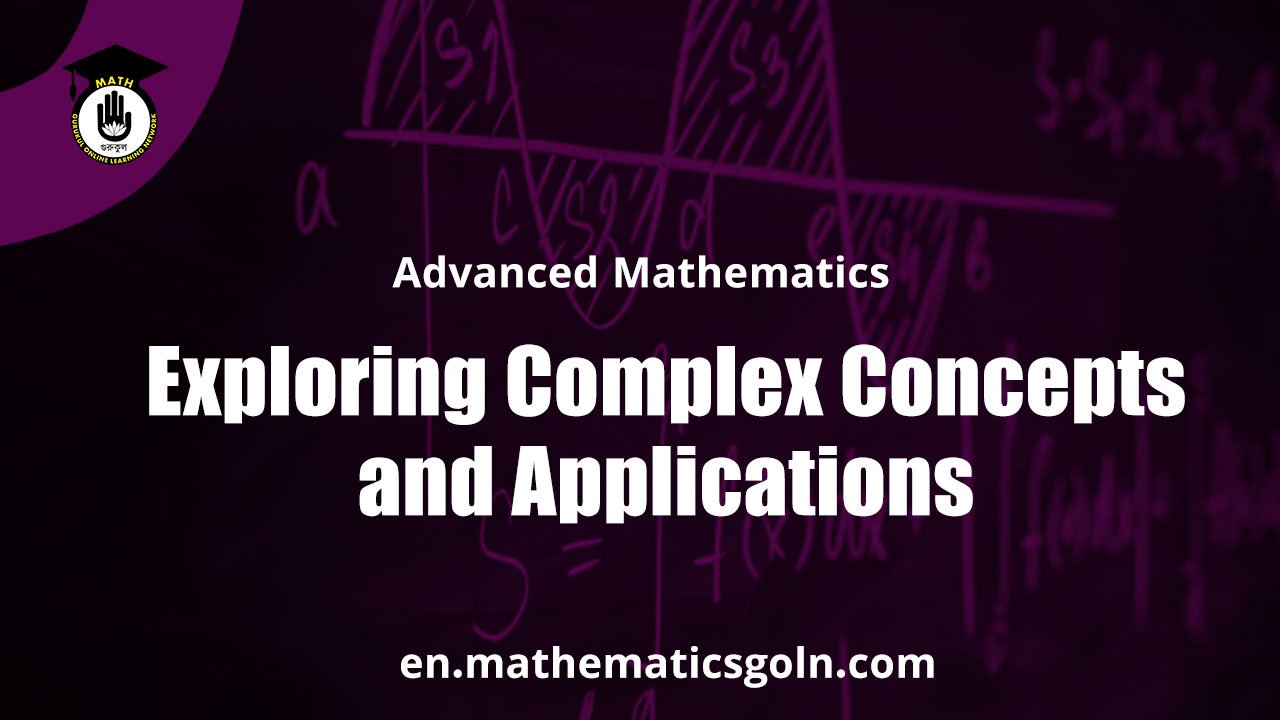Advanced mathematics encompasses a range of sophisticated and abstract concepts that extend beyond basic arithmetic and algebra. It plays a critical role in various fields such as engineering, physics, computer science, and economics. Mastering advanced mathematics not only enhances problem-solving skills but also provides a deeper understanding of the universe’s underlying principles. This article delves into some of the key areas of advanced mathematics, including calculus, linear algebra, abstract algebra, and differential equations, and explores their applications and significance.
Advanced Mathematics
1. Calculus
Calculus Overview:
Calculus is a fundamental branch of advanced mathematics focusing on change and motion. It is divided into two main areas: differential calculus and integral calculus.
– Differential Calculus: This area studies the concept of a derivative, which represents the rate of change of a function. It involves techniques for finding slopes of curves, optimizing functions, and modeling dynamic systems.
– Integral Calculus: Integral calculus deals with the concept of an integral, which represents the accumulation of quantities. It is used for calculating areas under curves, volumes of solids of revolution, and solving problems involving accumulation and distribution.
Applications:
Calculus is widely used in physics to model motion and forces, in engineering to design structures and systems, and in economics to analyze cost functions and optimize resources. It also plays a crucial role in computer graphics and machine learning.

2. Linear Algebra
Linear Algebra Overview:
Linear algebra is concerned with vector spaces and linear transformations. It provides a framework for understanding and solving systems of linear equations and exploring geometric and algebraic properties of vectors and matrices.
– Vectors and Matrices: Vectors represent quantities with direction and magnitude, while matrices are rectangular arrays of numbers used to represent linear transformations and solve systems of equations.
– Eigenvalues and Eigenvectors: These are key concepts in linear algebra that describe the behavior of linear transformations. Eigenvalues indicate the scale factor by which eigenvectors are stretched or compressed during transformation.
Applications:
Linear algebra is essential in various fields such as computer science for graphics and machine learning algorithms, engineering for structural analysis, and economics for optimization and econometrics. It also plays a vital role in quantum mechanics and data science.
3. Abstract Algebra
Abstract Algebra Overview:
Abstract algebra studies algebraic structures such as groups, rings, and fields. It generalizes the arithmetic operations of addition and multiplication to more complex structures.
– Groups: A group is a set equipped with an operation that satisfies four properties: closure, associativity, identity, and invertibility. Groups are fundamental in studying symmetry and permutations.
– Rings: A ring is a set equipped with two operations, typically addition and multiplication, that generalize the arithmetic of integers. Rings are used to study polynomial equations and algebraic structures.
– Fields: A field is a set where both addition and multiplication are defined and satisfy certain axioms. Fields are crucial in solving algebraic equations and cryptography.
Applications:
Abstract algebra has applications in cryptography for secure communications, in coding theory for error correction, and in various branches of mathematics and physics. It also provides the foundation for modern algebraic geometry and number theory.

4. Differential Equations
Differential Equations Overview:
Differential equations are equations that involve derivatives of functions. They describe the relationship between a function and its rates of change, and they are used to model dynamic systems.
– Ordinary Differential Equations (ODEs): ODEs involve functions of a single variable and their derivatives. They are used to model systems with one dependent variable, such as population growth or mechanical vibrations.
– Partial Differential Equations (PDEs): PDEs involve functions of multiple variables and their partial derivatives. They are used to model more complex systems, such as fluid dynamics, heat transfer, and wave propagation.
Applications:
Differential equations are used in various scientific and engineering fields to model physical phenomena and solve real-world problems. They are essential in fluid dynamics, thermodynamics, electromagnetism, and financial mathematics.

5. Complex Analysis
Complex Analysis Overview:
Complex analysis studies functions of complex variables and their properties. It extends the concepts of calculus to the complex plane, where functions can be analyzed in terms of their real and imaginary parts.
– Analytic Functions: These are functions that are locally represented by a power series and are differentiable in the complex plane. Analytic functions have properties such as conformality and the ability to be integrated along paths.
– Residue Theory: Residue theory is a method for evaluating complex integrals by calculating residues, which are related to the singularities of complex functions.
Applications:
Complex analysis is used in various areas such as electrical engineering for signal processing, fluid dynamics for analyzing complex flow patterns, and applied mathematics for solving integrals and differential equations.
6. Topology
Topology Overview:
Topology is the study of properties that remain invariant under continuous deformations, such as stretching or bending. It explores concepts like continuity, compactness, and connectedness.
– Topological Spaces: A topological space is a set equipped with a topology, which defines how subsets of the space are organized and related.
– Homotopy: Homotopy is a concept that studies the deformation of one function into another within a topological space, providing insight into the shape and connectivity of spaces.
Applications:
Topology has applications in various fields such as computer science for data analysis, biology for studying the shape of molecules, and physics for understanding the structure of space-time.
Advanced mathematics encompasses a range of complex and abstract concepts that are crucial for understanding and solving sophisticated problems in science, engineering, and beyond. Calculus, linear algebra, abstract algebra, differential equations, complex analysis, and topology are key areas that provide powerful tools for modeling, analyzing, and interpreting various phenomena. Mastery of these concepts not only enhances problem-solving skills but also opens doors to innovative applications and discoveries. Whether in theoretical research or practical applications, advanced mathematics remains a cornerstone of modern science and technology.
